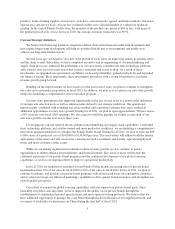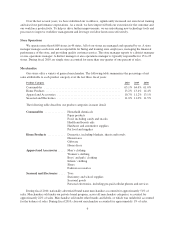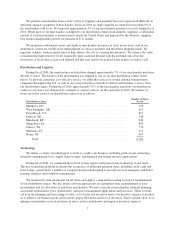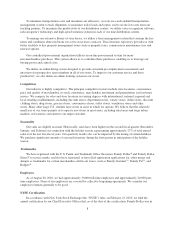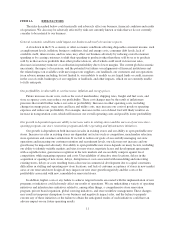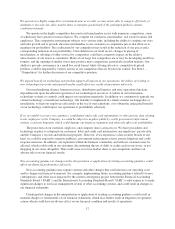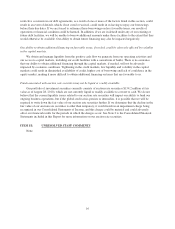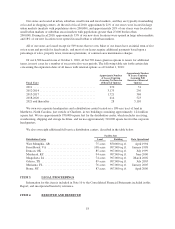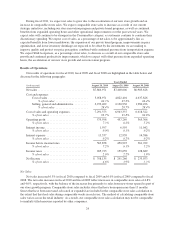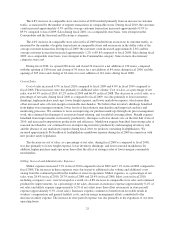Family Dollar 2010 Annual Report Download - page 19
Download and view the complete annual report
Please find page 19 of the 2010 Family Dollar annual report below. You can navigate through the pages in the report by either clicking on the pages listed below, or by using the keyword search tool below to find specific information within the annual report.hour laws. We are also a defendant in Scott, et al. v. Family Dollar Stores, Inc., a class action in which the
plaintiffs have alleged that the Company engaged in a pattern and practice of discriminating against female store
managers. The cost to defend these class-action lawsuits may be significant. Plaintiffs in these types of cases may
seek recovery of very large or indeterminate amounts, and the magnitude of the potential loss relating to these
lawsuits may remain unknown for substantial periods of time. In addition, certain of these lawsuits, if decided
adversely to us or settled by us, may result in liability material to our financial statements as a whole or may
negatively affect our operating results if changes to our business operation are required. There also may be
adverse publicity associated with litigation that could negatively affect customer perception of our business,
regardless of whether the allegations are valid or whether we are ultimately found liable. As a result, litigation
may adversely affect our business, financial condition and results of operations. See Note 10 to the Consolidated
Financial Statements included in this Report for further details regarding certain of these pending matters.
Inability to attract and retain employees could affect our business.
Our growth could be adversely impacted by our inability to attract and retain employees at the store
operations level, in distribution facilities, and at the corporate level, including our senior management team, at
costs which allow us to profitably conduct our operations. For example, we believe that the retention of managers
at the store level is one factor in reducing inventory shrinkage resulting from employee theft. Various other
factors, such as overall labor availability, wage rates, union organizing activity, regulatory or legislative impacts
and various benefit costs could all impact our ability to attract and retain employees negatively and may affect
our results of operations adversely.
Our business is slightly seasonal, and adverse events during the holiday season could impact our operating
results negatively.
Our business is slightly seasonal, with the highest percentage of sales (approximately 27% of total annual sales
over the last five fiscal years) occurring during the second fiscal quarter (December, January, and February). We
purchase significant amounts of seasonal inventory in anticipation of the holiday season. Adverse events, such as
deteriorating economic conditions, higher unemployment, higher gas prices, public transportation disruptions, or
unusual weather could result in lower-than-planned sales during the holiday season. This could lead to lower sales
or to unanticipated markdowns, impacting our financial condition and results of operations negatively.
We are exposed to the risk of natural disasters, unusual weather, pandemic outbreaks, war and terrorism that
could disrupt business and result in lower sales, increased operating costs and capital expenditures.
Our headquarters, store locations and distribution centers, as well as certain of our vendors and customers, are
located in areas which could be subject to natural disasters such as floods, hurricanes, tornadoes or earthquakes.
Adverse weather conditions or other extreme changes in the weather, including resulting electrical and
technological failures, may disrupt our business and may adversely affect our ability to sell and distribute products.
In addition, we operate in markets that may be susceptible to pandemic outbreaks, war or terrorism. Our business
may be harmed if our ability to sell and distribute products is impacted by any such events, any of which could
influence customer trends and purchases and may negatively impact our net sales, properties or operations. Such
events could result in physical damage to one or more of our properties, the temporary closure of some or all of our
stores or distribution centers, the temporary lack of an adequate work force in a market, temporary or long-term
disruption in the transport of goods, delay in the delivery of goods to our distribution centers or stores, disruption of
our technology support or information systems, or fuel shortages or dramatic increases in fuel prices, which increase
the cost of doing business. Any of these factors, or combination thereof, could affect our operations adversely.
Failure to comply with our debt covenants could affect our capital resources, financial condition and liquidity
adversely.
Our debt agreements contain certain restrictive covenants, which impose various operating and financial
restrictions on us. Such restrictions include, but are not limited to, a consolidated debt to consolidated
capitalization ratio, a fixed charge coverage ratio, and a priority debt ratio. Our failure to comply with the
15


